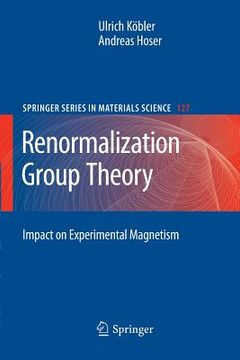Compartir
renormalization group theory: impact on experimental magnetism (en Inglés)
Ulrich Köbler
(Autor)
·
Andreas Hoser
(Autor)
·
Springer
· Tapa Blanda
renormalization group theory: impact on experimental magnetism (en Inglés) - Köbler, Ulrich ; Hoser, Andreas
$ 244.69
$ 489.38
Ahorras: $ 244.68
Elige la lista en la que quieres agregar tu producto o crea una nueva lista
✓ Producto agregado correctamente a la lista de deseos.
Ir a Mis Listas
Origen: Estados Unidos
(Costos de importación incluídos en el precio)
Se enviará desde nuestra bodega entre el
Viernes 12 de Julio y el
Viernes 19 de Julio.
Lo recibirás en cualquier lugar de Internacional entre 1 y 3 días hábiles luego del envío.
Reseña del libro "renormalization group theory: impact on experimental magnetism (en Inglés)"
Spin wave theory of magnetism and BCS theory of superconductivity are typical theories of the time before renormalization group (RG) theory. The two theories consider atomistic interactions only and ignore the energy degrees of freedom of the continuous (infinite) solid. Since the pioneering work of Kenneth G. Wilson (Nobel Prize of physics in 1982) we know that the continuous solid is characterized by a particular symmetry: invariance with respect to transformations of the length scale. Associated with this symmetry are particular field particles with characteristic excitation spectra. In diamagnetic solids these are the well known Debye bosons. This book reviews experimental work on solid state physics of the last five decades and shows in a phenomenological way that the dynamics of ordered magnets and conventional superconductors is controlled by the field particles of the infinite solid and not by magnons and Cooper pairs, respectively. In the case of ordered magnets the relevant field particles are called GSW bosons after Goldstone, Salam and Weinberg and in the case of superconductors the relevant field particles are called SC bosons. One can imagine these bosons as magnetic density waves or charge density waves, respectively. Crossover from atomistic exchange interactions to the excitations of the infinite solid occurs because the GSW bosons have generally lower excitation energies than the atomistic magnons. According to the principle of relevance the dynamics is governed by the excitations with the lowest energy. The non relevant atomistic interactions with higher energy are practically unimportant for the dynamics.
- 0% (0)
- 0% (0)
- 0% (0)
- 0% (0)
- 0% (0)
Todos los libros de nuestro catálogo son Originales.
El libro está escrito en Inglés.
La encuadernación de esta edición es Tapa Blanda.
✓ Producto agregado correctamente al carro, Ir a Pagar.

